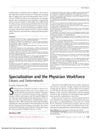40 citations,
June 2021 in “Clinical, cosmetic and investigational dermatology” JAK inhibitors show promise in effectively treating hair loss from alopecia areata.
 1 citations,
January 2017 in “Springer eBooks”
1 citations,
January 2017 in “Springer eBooks” Understanding the immune-related causes of Alopecia Areata has led to potential treatments like JAK inhibitors.
 October 2024 in “Journal of Education Health and Sport”
October 2024 in “Journal of Education Health and Sport” Alopecia areata treatment should be personalized, using topical or systemic therapies based on severity, with promising options like JAK inhibitors needing more research.

Alopecia Areata has no cure, treatments are limited, and the condition often recurs, but new therapies like JAK inhibitors show promise.
21 citations,
May 2017 in “Paediatric drugs” Individualized treatment plans are crucial for children with alopecia areata, with promising options like JAK inhibitors showing significant hair regrowth.
 184 citations,
February 2015 in “EBioMedicine”
184 citations,
February 2015 in “EBioMedicine” A patient with Alopecia Areata had complete hair regrowth after using the drug baricitinib.
 82 citations,
March 2016 in “Autoimmunity reviews”
82 citations,
March 2016 in “Autoimmunity reviews” Animal models have helped understand hair loss from alopecia areata and find new treatments.
 37 citations,
May 2016 in “Deutsches Arzteblatt International”
37 citations,
May 2016 in “Deutsches Arzteblatt International” Hair loss requires customized treatments based on its various causes and types.
 9 citations,
December 2017 in “The Journal of Allergy and Clinical Immunology”
9 citations,
December 2017 in “The Journal of Allergy and Clinical Immunology” New targeted therapies for hair loss from alopecia areata show promise, with personalized treatment expected in the future.
 6 citations,
June 2016 in “Experimental Dermatology”
6 citations,
June 2016 in “Experimental Dermatology” Frontal Fibrosing Alopecia is a poorly understood condition that is hard to treat and causes distressing hair loss.
 October 2020 in “Revista médica sinergía/Revista médica sinergia”
October 2020 in “Revista médica sinergía/Revista médica sinergia” Alopecia areata is a complex condition causing hair loss, linked to genetics and immune system issues, and may be related to other autoimmune diseases; treatments vary in effectiveness.
 66 citations,
February 2015 in “Cell & tissue research/Cell and tissue research”
66 citations,
February 2015 in “Cell & tissue research/Cell and tissue research” The document concludes that there are no effective clinical treatments for hearing loss due to hair cell damage, but research is ongoing.
 8 citations,
May 2017 in “Singapore Medical Journal”
8 citations,
May 2017 in “Singapore Medical Journal” A Korean woman with complete hair loss regrew her hair after taking tofacitinib, with no side effects.
 99 citations,
July 2017 in “Clinical Reviews in Allergy & Immunology”
99 citations,
July 2017 in “Clinical Reviews in Allergy & Immunology” New treatments for Alopecia Areata show promise but need to be more effective and affordable.
 45 citations,
April 2019 in “International Immunology”
45 citations,
April 2019 in “International Immunology” The study concluded that immune cells attacking hair follicles cause hair loss in alopecia, with genetics and environment also playing a role, and highlighted the potential of certain treatments.
5 citations,
July 2020 in “Recent patents on inflammation & allergy drug discovery” Childhood Alopecia Areata causes hair loss and requires varied treatments, with psychological support being crucial.
 4 citations,
November 2023 in “Frontiers in immunology”
4 citations,
November 2023 in “Frontiers in immunology” New treatments targeting T-cell pathways are needed for better alopecia areata management.
 1 citations,
March 2023 in “Clinical, Cosmetic and Investigational Dermatology”
1 citations,
March 2023 in “Clinical, Cosmetic and Investigational Dermatology” Current treatments for Alopecia Areata have mixed success, and there's a need for better, more accessible options and support for affected individuals.
 March 2022 in “Wound practice & research”
March 2022 in “Wound practice & research” New treatments for alopecia areata show promise, but standardized guidelines are needed.
 July 2023 in “IntechOpen eBooks”
July 2023 in “IntechOpen eBooks” New treatments for alopecia areata show promise, but more research is needed to confirm their effectiveness.
 May 2023 in “Journal of Clinical Medicine”
May 2023 in “Journal of Clinical Medicine” New understanding and treatments for hair loss are improving, but more research is needed.
14 citations,
March 2017 in “Genes and immunity” Certain microRNAs may help treat alopecia areata by targeting immune pathways.
August 2024 in “Cosmetics” Personalized treatments for hair loss are becoming more effective by using genetic information.
 74 citations,
May 2016 in “Current opinion in pediatrics, with evaluated MEDLINE/Current opinion in pediatrics”
74 citations,
May 2016 in “Current opinion in pediatrics, with evaluated MEDLINE/Current opinion in pediatrics” Both vitiligo and alopecia areata involve an immune response triggered by stress and specific genes, with treatments targeting this pathway showing potential.
 148 citations,
December 2018 in “Journal of autoimmunity”
148 citations,
December 2018 in “Journal of autoimmunity” Alopecia areata is an autoimmune disease causing patchy hair loss, often with other autoimmune disorders, but its exact causes are unknown.
 70 citations,
April 2016 in “Experimental Dermatology”
70 citations,
April 2016 in “Experimental Dermatology” A patient with alopecia areata regrew hair after taking tofacitinib and showed changes in certain blood and skin markers.
 54 citations,
September 2019 in “Journal of the European Academy of Dermatology and Venereology”
54 citations,
September 2019 in “Journal of the European Academy of Dermatology and Venereology” Tofacitinib is somewhat effective for alopecia areata, but more research is needed on its safety and long-term effects.
 27 citations,
September 2000 in “JAMA”
27 citations,
September 2000 in “JAMA” The document suggests changing medical education to balance generalists and specialists, focusing on patient needs.
 2 citations,
November 2023 in “Frontiers in microbiology”
2 citations,
November 2023 in “Frontiers in microbiology” The health of the gut may be important in developing new ways to prevent, diagnose, and treat alopecia areata.
 1415 citations,
October 2007 in “European Journal of Epidemiology”
1415 citations,
October 2007 in “European Journal of Epidemiology” The Rotterdam Study investigates diseases in older adults and has produced many research findings.
























